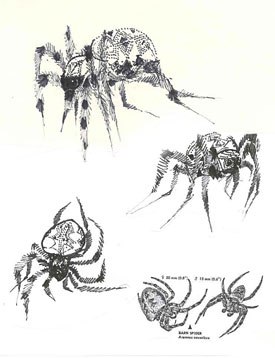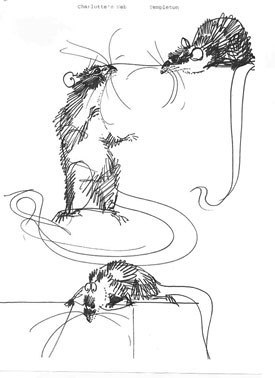Gene Deitch continues the hairy tails of eventually not making Charlottes Web.

E.B. White hoped that Charlottes Web on film would celebrate life. Above is Mother Pig and Baby Wilbur from the storyboards that were prepared for Gene Deitchs planned production. All images by Mirko Hanák.
An excerpt from Gene Deitchs How to Succeed in Animation (Dont Let a Little Thing Like Failure Stop You!).
Read the beginning of the correspondence between Gene Deitch and legendary author E. B. White. The exchange continues
Answering this, Andy both agrees with and skillfully tempers my probings. I am learning the basics from him!
E.B. WHITENORTH BROOKLIN, MAINE
January 12, 1971
Dear Gene:
It was generous of you to send me such a detailed report of your scheme for the picture. This afternoon I sent you a few more photographs they were taken in Canada, but they are close to New England in form and spirit.
You said in your letter (about my script) how I wish I had the whole thing. You have everything I wrote; there wasnt any more.
Ive studied your letter very carefully and find myself in sympathy, or agreement, with most of it. I do hope, though, that you are not planning to turn Charlottes Web into a moral tale. It is not that at all. It is, I think, an appreciative story, and there is quite a difference. It celebrates life, the seasons, the goodness of the barn, the beauty of the world, the glory of everything. But it is essentially amoral, because animals are essentially amoral, and I respect them, and I think this respect is implicit in the tale. I discovered, quite by accident, that reality and fantasy make good bedfellows. I discovered that there was no need to tamper in any way with the habits and characteristics of spiders, pigs, geese and rats. No motivation is needed if you remain true to life and true to the spirit of fantasy.
I would hate to see Charlotte turned into a dedicated spider: she is, if anything, more the Mehitabel type-toujours gai. She is also a New Englander, precise and disciplined. She does what she does. Perhaps she is magnifying herself by her devotion to another, but essentially she is just a trapper....
As for Templeton, hes an old acquaintance and I know him well. He starts as a rat and he ends as a rat the perfect opportunist and a great gourmand. I devoutly hope that you are not planning to elevate Templeton to sainthood....

White implored Deitch to be true to Charlottes spider nature.
An aura of magic is essential, because this is a magical happening. Much can be done by music of the right kind, as when the moment arrives when communication takes place between the little girl and the animals in the barn cellar. This is truly a magical moment and should be so marked by the music. (I hear it as a sort of thrumming, brooding sound, like the sound of crickets in the fall, or katydids, or cicadas. It should be a haunting, quiet, steady sound subdued and repetitive. )
Even more can be done by words, if you are able to use them. (Youll have to forgive me for being a word man, but thats what I am.)
In writing of a spider, I did not make the spider adapt her ways to my scheme. I spent a year studying spiders before I ever started writing the book. In this, I think I found the key to the story. I hope you will, in your own medium, be true to Charlotte and to nature in general.
My feeling about animals is just the opposite of Disneys. He made them dance to his tune and came up with some great creations, like Donald Duck. I preferred to dance to their tune and came up with Charlotte and Wilbur. It would be futile and unfair to compare the two approaches, but you are stuck with my scheme and will probably come out better if you go along with it. Both techniques are all right, each in its own way, but I have a strong feeling that you cant mix them. It just comes natural to me to keep animals pure and not distort them or take advantage of them.
Interdependence? I agree that the film should be a paean to life, a hymn to the barn, an acceptance of dung. But I think it would be quite untrue to suggest that barnyard creatures are dependent on each other. The barn is a community of rugged individualists, everybody mildly suspicious of everybody else, including me. Friendships sometimes develop, as between a goat and a horse, but there is no sense of true community or cooperation. Heaven forefend! Joy of life, yes. Tolerance of other cultures, yes. Community, no.
I just want to add that there is no symbolism in Charlottes Web. And there is no political meaning in the story. It is a straight report from the barn cellar, which I dearly love, having spent so many fine hours there, winter and summer, spring and fall, good times and bad times, with the garrulous geese, the passage of swallows, the nearness of rats, and the sameness of sheep.
K sends her best to you and Zdenka.
Yrs,
Andy

White did not want the rat Templeton (model above) to be cleaned up and made nice.
If by chance youve forgotten what a great writer E.B.White was, just read his next letter to me, and feel my inspiration.
E.B. WHITE NORTH BROOKLIN, MAINE
February 3, 1971
Dear Gene:
Thanks for your great letter. I agree with William James. If the film of Charlottes Web, or any other film you make, outlasts you, you are 1iving properly. It is true that my story celebrates the great themes, birth, death, renewal; and it is true that it explores the high virtues friendship, love, loyalty, fidelity. But being a fabulist, I can assure you that this is a story of the aninma1 kingdom, which of course includes that strangest of the mammals man. It is not a story of the human kingdom, or human condition, and any attempt to cut it down to that level would invite disaster. When I wrote the book, I was operating on the highest level (which incidentally is where you meet children face to face and where dumb creatures and humans mingle in perfect equality).
It is all very well to say that Charlottes Web was a web of love which extended beyond her own lifespan. But you should never lose sight of the fact that it was a web spun by a true arachnid, not by a de facto person. One has eight legs and has been around for an unbelievably long time on this earth; the other has two legs and has been around just long enough to raise a lot of hell, drain the swamps, and bring the planet to the verge of extinction.
I am not trying to disclaim the message in the book. I just want to make sure youve got the message. A fabulist takes animals and gives them an extra dimension, in this case speech. Certainly one of the commonest assumptions of the human animal is that the universe was constructed for his particular benefit, that he is the center of it, and that the, other creatures are of an inferior sort spotted about to lend variety to the scene. A false and dangerous assumption.
Remember Warty Bliggens? the toad that believed that the earth existed for his particular enjoyment, the sun to give him light by day and the moon and wheeling constellations to make beautiful the night for the sake of Warty Bliggens. Warty was the creation of Don Marquis, another fabulist. Its one of his best pieces. As you say, spiders do not talk to pigs, except in the world of the fable. But when conversation does finally take place, in that fabulous and pure world, it is indeed a spider who talks, indeed a pig. It is not a woman in spiders clothing, or a boy in a pigs skin. Be true to animals, O Good Gene, and you will live forever. When you enter the barn cellar, remove your hat.
May good luck and a steady faith go with you!
Yrs,
Andy
To read more about Genes adventures in the animation world, visit Genes online book.
Gene Deitch is one of the last surviving members of the original Hollywood UPA studio of 1946 and the instigator of the CBS-Terrytoon renaissance of 1956-1958. He was also: animation department chief of the Detroit Jam Handy Organization; 1949-1951, creative chief of UPA-New York, 1951-1954; director at John Hubleys Storyboard, Inc., New York, 1955; president of Gene Deitch Associates, Inc., New York, 1958-1960; creative director for Rembrandt Films, 1960-1968; and star director for Weston Woods Studios, Inc., Weston, Connecticut, 1968-1993. He has worked for more than 40 years with the Prague animation studio, Bratri v Triku.







